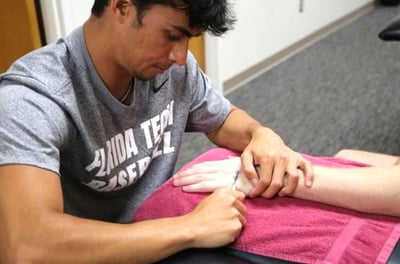ATs: the Swiss Army Knife in the Medical World
 At Florida Tech, a team of dedicated Athletic Trainers—often seen as the behind-the-scenes heroes of sports—work tirelessly to ensure the health and readiness of athletes across fourteen sports.
At Florida Tech, a team of dedicated Athletic Trainers—often seen as the behind-the-scenes heroes of sports—work tirelessly to ensure the health and readiness of athletes across fourteen sports.
This team includes Shawn Spenard, Luis Velez, Grahm Pratt, and Mellisa Wieand, who collectively manage the well-being of athletes from soccer to swimming. Velez, the Head Athletic Trainer with over two decades of experience, handles responsibilities for volleyball, men’s swimming, women’s lacrosse, and men’s rowing. Spenard, with almost four years as an AT, covers women’s soccer, men’s basketball, and baseball.
Velez, the Head Athletic Trainer with over two decades of experience, handles responsibilities for volleyball, men’s swimming, women’s lacrosse, and men’s rowing. Spenard, with almost four years as an AT, covers women’s soccer, men’s basketball, and baseball.
Pratt looks after men’s soccer, women’s basketball, and softball, while Wieand, a recent recruit from the Green Bay Packers, manages men’s cross country and track, women’s swimming, and men’s lacrosse.
Their roles extend far beyond just sideline support during games. They are integral in emergency care, rehabilitation, injury prevention, and even mental health support.
These trainers are deeply involved in the day-to-day healthcare of athletes, developing comprehensive treatment plans, conducting nutrition and wellness research, and ensuring safety through emergency action plans and environmental monitoring. Spenard shared:
"The athletic training hat is a very big hat. We’re not here to tape ankles, but to take care of people. When it comes to what our knowledge is based around, musculoskeletal injuries are our biggest responsibility."
Despite the demanding nature of their work, which often includes long and inconsistent hours, the passion for their profession shines through. Pratt reflected:
"It's really rewarding when you first diagnose an injury and go through the rehab, especially if it's a long rehab process. You get to be there, watch athletes at practice, get them back to health and watch them in a game.”
However, the job isn't without its challenges. Issues such as burnout, competitive pay, and a lack of work-life balance have led many Athletic Trainers to transition to other careers. Velez admitted:
"We do it because we love it, but unfortunately, we get ourselves burned out."
The ATs at Florida Tech also contribute to the education of future professionals by working closely with interns from Keiser University, fostering a nurturing environment for upcoming Athletic Trainers.
In an ever-evolving field, these ATs remain committed to their roles, driven by a foundational belief in evidence-based practice and the ongoing need for professional development. Every March, during National Athletic Training Month, their contributions are highlighted, advocating for broader recognition of their vital role in healthcare.
"We’re medical personnel, not a coach."
Velez stated, clarifying the often-misunderstood nature of their profession. From the fields of Florida Tech to the broader community, these Athletic Trainers continue to make significant impacts, demonstrating that their work is crucial not only in sports but in the healthcare landscape at large.
Read Mackenzie Smith's full column from the Florida Tech Crimson!
![HR Logo [Recovered]_Full Color Vertical-1](https://blog.healthyroster.com/hs-fs/hubfs/HR%20Logo%20%5BRecovered%5D_Full%20Color%20Vertical-1.png?width=199&height=178&name=HR%20Logo%20%5BRecovered%5D_Full%20Color%20Vertical-1.png)
 By
By


